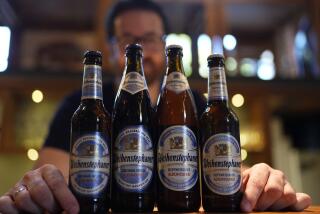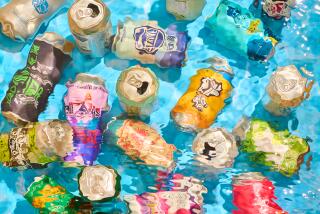California beer maker has the last laugh in his German brewery

Some Germans thought Koch was courageous, while others considered him crazy. (Aug. 8, 2017)
Reporting from Berlin — Some Germans thought Greg Koch was courageous. Others considered the Californian crazy.
In one of the world’s biggest beer drinking countries, already saturated with 1,388 breweries and 5,000 brands of beer, the entrepreneur from San Diego was determined to establish an American-style craft beer brewery.
It took courage, craziness — and chutzpah.
But a year after Koch opened his now-thriving brewery, beer garden and restaurant in the Mariendorf section of south-central Berlin, Germans are no longer laughing at the 52-year-old executive chairman and co-founder of Stone Brewing Co.
It is a cavernous temple to beer built out of the ruins of an abandoned gasworks plant dating to the turn of the last century. About half of the splendidly refurbished 34,000-square-foot factory floor in the red brick building was turned into the brewery that will produce 925,000 gallons of beer this year for Germany and export to 24 European countries — especially Britain, Sweden and the rest of Scandinavia.
The beer styles are, for the most part, the same as those Stone produces in the United States, including Stone IPA and Stone Ruination Double IPA.
The other half of the former gasworks, separated from the tropical temperatures in the brewery by a spectacular floor-to-ceiling glass window, is reserved for the relaxed, California-style restaurant for up to 1,100 people. It has a bar that features 75 beers on tap and, for German standards, uncommonly friendly service staff.
“When they hear about us, the average German thinks, ‘Wow, that’s a pretty odd idea,’” Koch said in an interview when asked about the audacity of investing $29 million in an American brewery in Berlin. “They look at me with this quizzical expression like: ‘Don’t you know we already have beer in Germany?’”
Other Germans, many with a beer superiority complex that comes with their 1,200-year beer tradition, are less diplomatic: “They’re like, ‘This is a crazy idea and what could you, as an American, possibly know about beer?’” Koch said.
There is a lingering assumption here that American beer is nothing more than a watered-down imitation of the bier that Germans like to think is one of their most important gifts to the world.
“The average German considers American beer to be thoroughly undrinkable, and that’s thanks to beer like Bud Light,” said Nina Anika Klotz, the founder of Germany’s first and largest craft beer magazine, Hopfenhelden. “That reputation of watery beer has made it even more difficult for Stone. It’s only been in recent years, thanks to younger Germans who’ve tried American craft beer, who know the truth is completely different and the quality of American craft beer is truly outstanding.”
But it’s not only younger Germans who have discovered Koch’s craft beer palace. “Some Germans have complained, ‘What’s an American doing here trying to teach us about beer?’” said Michael Jastram, a 63-year-old Berlin sculptor and regular patron. “But it tastes great. It’s strong, an excellent product.”
Germans celebrate their famous brews, their beer-drinking and their powerful brewing industry with a near-patriotic enthusiasm. Even though consumption has slipped in recent decades because of increased health consciousness, Germans still drink an average of 28 gallons of beer a year, third in the world behind the Austrians and Czechs.
“Germany’s industrial beer is better than our industrial beer,” Koch said. “But, of course, who wants to drink industrial beer?”
Germans, he said, pay less for beer than any other Western Europeans. “Most Germans will react as if that’s a point of pride, like, ‘It’s cheap, it’s a great thing,’” he said. “But I say: Hang on. Cheap is not an attribute. The only possible result of cheap beer is cheap beer.”
Koch said he wants Germans to try what he insists is better-tasting beer, even if it costs double or triple what they’re used to paying. But Stone’s move to Germany also reflects the slowing growth that craft brewers are facing in the U.S. after years of rapid expansion. Stone, which had more than $200 million in sales last year and is the ninth largest craft brewer in the United States, laid off roughly 5% of its 1,200-employee workforce last October.
Klotz at Hopfenhelden said Europeans are quickly learning, as Americans have, to savor the richer flavors of craft beers. Many are surprised to learn that, with more than 150 beer styles and 20,000 brands, the United States now has more choice than any other country.
But Klotz said Stone Brewing faces two major problems in Germany: its relatively high prices and the fact that it sells beer in cans. Craft brewers say that cans better preserve freshness, but many Germans don’t see it that way.
“Cheap beer comes in cans,” Klotz said. “It’s what the bums in the street drink. Germans are used to drinking beer in bottles because they want to recycle them, not throw them away.”
Koch agreed that he faces an uphill battle in Germany, where most people believe the country’s 501-year-old Reinheitsgebot, or beer purity law, means German brews will always be superior.
“It’s a form of brainwashing,” Koch said. “Germans have been told by the big industrial brewers over and over again that Americans are incapable of brewing anything that would qualify under the Reinheitsgebot.” He said that 95% of Stone Brewing beers would pass the beer purity law.
Hans Wagner, a 59-year-old electrician, was enjoying an IPA recently in the Stone beer garden and said he didn’t really care about the Reinheitsgebot. “The only thing that matters is that it tastes good, and this tastes very good, very fresh and very strong,” said Wagner, an Austrian who has lived in Berlin for decades. “I have to admit I was skeptical at first about American beer. You hear only negative things about the big brewers there. But this is good stuff. I don’t know if Germans will take to it, though. They think their beer is the best in the world.”
Kirschbaum is a special correspondent.
ALSO
An outspoken researcher of Stalin’s crimes fights for his own fate and freedom in Russia
Lots of ‘craft’ beer is brewed by multinationals — here’s how to spot the independents
More to Read
Sign up for Essential California
The most important California stories and recommendations in your inbox every morning.
You may occasionally receive promotional content from the Los Angeles Times.










